Pope Leo and Creation Care
Air Date: Week of May 16, 2025
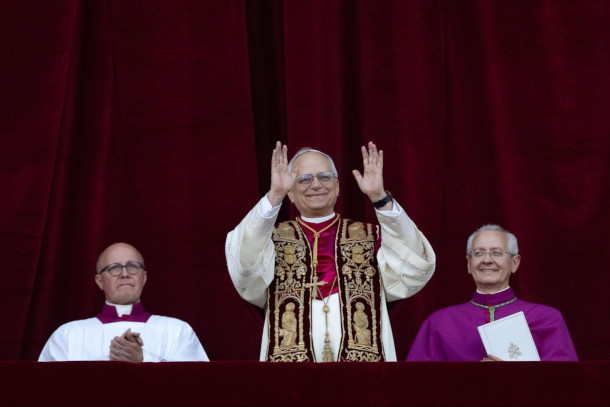
Pope Leo XIV (center), the first US born pontiff, addresses the crowd from the balcony of St. Peter's Basilica. Behind him are a member of the Catholic clergy (left) and Archbishop Diego Giovanni Ravelli (right). (Photo: Catholic Church of England, Flickr, CC BY NC ND 2.0)
The new Pope, Leo XIV, has worked with interfaith environmental networks and there’s hope around the world that he may follow in the footsteps of his predecessor Pope Francis and bring issues of the environment and climate change to the forefront of his agenda. Dr. Erin Lothes is a former professor of Catholic theology who now promotes global eco spirituality education and climate action with the Laudato Si’ Movement and she joins Host Aynsley O’Neill to shed light on Pope Leo XIV’s rhetoric on environment.
Transcript
[THEME]
CURWOOD: From PRX and the Jennifer and Ted Stanley Studios at the University of Massachusetts, Boston, this is Living on Earth. I’m Steve Curwood.
O’NEILL: And I’m Aynsley O’Neill.
The new Pope could guide the Catholic Church into a new era of care for the environment. Pope Leo XIV, once known as Robert Prevost, previously served as a bishop in Chiclayo, Peru, a city not far from the Amazon rainforest. And according to the Associated Press, “Prevost deepened his ties with interfaith environmental networks like the Interfaith Rainforest Initiative and Indigenous organizations” which place “forest protection and rights at the center of Church concern.” He was also the president of the Pontifical Commission for Latin America, which connected him with neighboring countries that are also home to the Amazon. So there’s hope around the world that the new Pope may follow in the footsteps of his predecessor Pope Francis and bring issues of the environment and climate change to the forefront of his agenda. Dr. Erin Lothes is a former professor of Catholic theology who now promotes global eco spirituality education and climate action with the Laudato Si’ Movement, named for Pope Francis’ ecological encyclical. And she joins us now to shed more light on Pope Leo XIV. Erin, welcome to Living on Earth!
LOTHES: Thank you so much, Aynsley. I am delighted to be with you.
O'NEILL: What have we heard so far from Pope Leo about the environment?
LOTHES: When Robert Francis Prevost was still Cardinal in 2024 he attended a conference in Rome on the environmental crisis, and in his remarks, he stressed that it's time to move from words to action, and that we must find our guidance from Catholic social teaching, which includes Rerum Novarum from 1891 all the way up to Laudato Si and Laudato Deum. And he further said that dominion over nature should not become tyrannical. So a critique of this commonly heard critique that we are stewards, we have dominion. No, this is a false interpretation of the Bible, and it's been denounced by Pope Francis and by countless theologians. He further said that there must be a relationship of reciprocity with the environment of mutual care. So that is that beautiful recognition that we depend on the environment for all our sustenance, and today, the environment needs us to do our part and care for it. Likewise, he cautioned against the harmful consequences of technological development and this is a clear pillar of Catholic teaching about the environment. Technology is a blessing. The products of human ingenuity and engineering are a gift that makes life easier, healthier, safer, more dignified, yet technology can go out of control. We can have technologies with harmful impacts. And so just because something is new, that doesn't mean it's progress. We need to ethically and culturally evaluate every new technology and see if it brings about the common good. And so he emphasized how Vatican City has committed to protecting the environment, like installing solar panels and shifting to electric vehicles. So those are some of his clear public on the record statements about the environment.
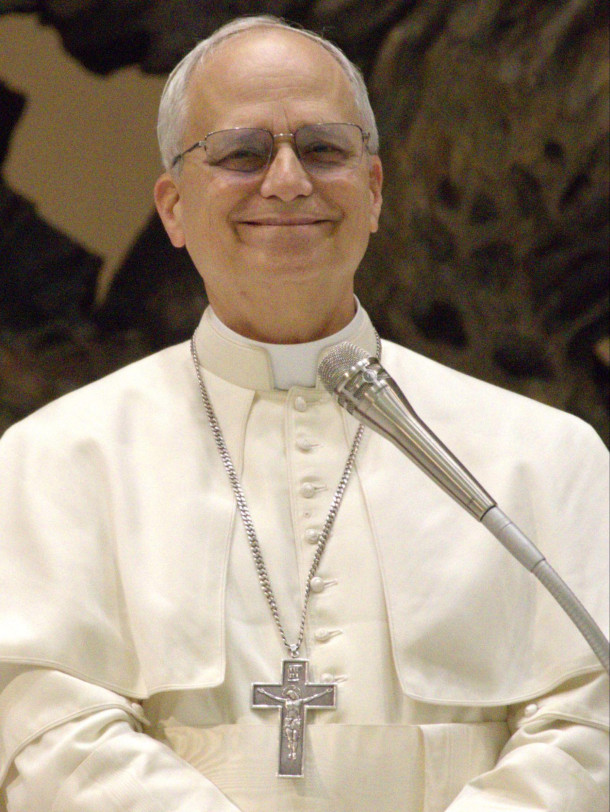
Pictured above is Pope Leo the XIV, formerly known as Robert Prevost. (Photo: Edgar Beltran, Wikimedia Commons, CC BY SA 2.0)
O'NEILL: And from what I've read so far, it seems like he aligns with Pope Francis on a few key issues. What are his sort of marching orders as he inherits Pope Francis's legacy? And of course, what part of that portfolio is the climate emergency?
LOTHES: Listening to others, I think is one of his top agendas. As you say, his marching orders for Pope Francis. Pope Francis opened up the entire church to a listening process, which is also such a new moment in the church. This was called the synodal process, which means walking together the Synod. And he invited every single Catholic in every parish around the world to meet together, to listen to each other in round table discussion, to take notes and pass that up to the bishop, to pass that up to the national Bishops Conference, to pass that up to Rome. It's this unthinkable gathering of the thoughts and hopes and dreams of the ordinary Catholic to share what's so precious about their faith. So this whole synodal process has been going on for years, and really from his dying days, Pope Francis called for the Synod to continue. And in his opening message from the balcony in Rome, Pope Leo the 14th said "let us walk together" and that is a very clear reference to the ongoing desire to continue this listening process, this common, shared, humble listening process.
O'NEILL: And he chose the name Leo. Why is that? And for that matter, what was Pope Leo XIII known for?
LOTHES: It's so significant. As soon as we all heard the name Leo the XIV, so many values and images left into mind. It's just as when Jorge Maria Bergoglio chose the name Francis, everybody caught their breath. Oh, my goodness, Francis. There was never a Francis never, ever in 2,013 years. And we know what it meant, right? St. Francis is the patron of ecology. He was this humble radical man who called the wolf his brother and the water his sister. So it was almost shocking. And when we hear Leo the XIII, he is most known for his teaching letter, his encyclical Rerum Novarum, which means on new things, or maybe on revolutionary change, because writing in 1891 Pope Leo was aware of the suffering of urban poverty, of the needs of workers, of the crises that came with factories and smoke stacks and child labor and the struggle for fair wages and the needs for workers to have representation vis a vis the owners of factories, etc., and he advocated for them to be able to care for their needs. So this document is recognized as the foundation of modern Catholic social teaching. So for Cardinal Prevost to choose the name Leo the XIV, he's saying that he will continue this concern for the poor in a new situation, in the poverty and in the crises of today, this concern for the poor, especially for new crises and critiques of the excesses of hyper neoliberal capitalism, are implied in this name.
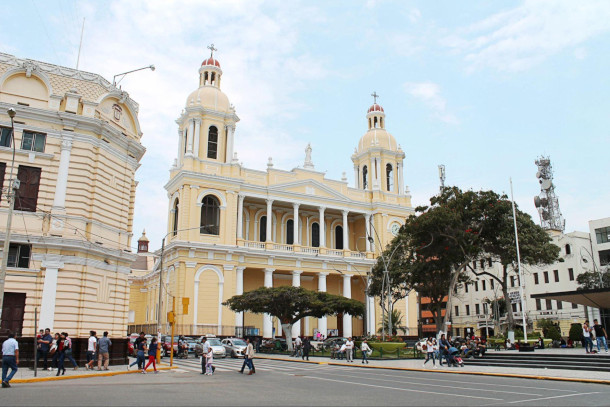
Santa Maria Cathedral in Chiclayo, Peru. Santa Maria is part of the Diocese of Chiclayo, where Robert Prevost served as bishop from 2015 to 2023. (Photo: Frank Coronel Mendoza, Wikimedia Commons, CC BY SA 4.0)
O'NEILL: What would you say is the influence or the role that a pope takes in times of emergency, like the climate crisis that we're facing right now?
LOTHES: There is a lot of influence that a pope can have. Many see the pope as a most visible moral authority, given that he is the one single leader of a very, very large religious community. And so for one thing, he has the world's biggest pulpit. He has the greatest capacity to preach care of creation to the world. He has the ability to engage all the bishops of the world, which embrace a population of 1.4 billion Catholics. That's on the practical level. The pope can also speak to the political and diplomatic community, as Pope Francis did attending global conferences, coming to speak to the Congress of the United States, as he did, he hoped to attend the last COP, unfortunately he was not well, but those are the things they can do. And by issuing Laudato Si right before the Paris conference, he deliberately and effectively influenced the outcome of that historic gathering. Pope Francis engaged with the heads of oil corporations. He invited them to his office and had a meeting with the executives of fossil fuel companies. This is an astonishing direct engagement, and that's something that very few groups can do in a moral sense. So there's a lot of influence that the Pope has, and as an American, Pope Leo the 14th will have an even more intense capacity to engage successfully from within our culture, as someone who not only understands it, but lives it and can't be dismissed as someone from the global south, from a developing nation, someone influenced by liberation theology. Here's a person who grew up in our American democratic capitalism in the best sense, and is fully capable of engaging it very directly.
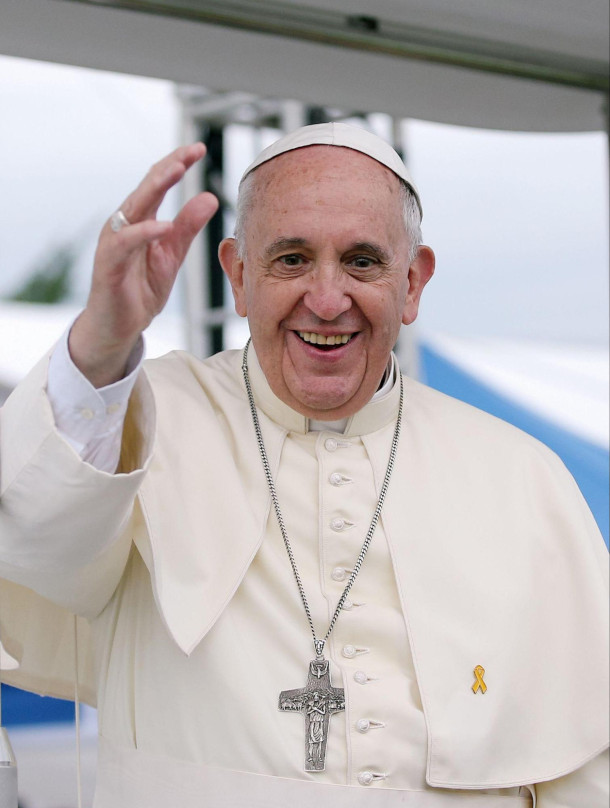
Pope Francis was the first Latin American pope, and his papacy was recognized for his commitment to the poor and environmental stewardship. (Photo: Korean Culture, Wikimedia Commons, CC BY SA 2.0)
O'NEILL: Erin from a sort of broad perspective, what is the connection between the Catholic faith and the environment and the climate? What is the connection there?
LOTHES: First of all, just honoring our life, our existence on this planet, is an act of faith. And then in the sense of our interdependence with all creatures, we are here to care for each other, to care for our neighbor. And in a time of climate crisis, that means attending to healing the wounds of the planet and the degradation of the planet that is challenging the well being and the health and the survival of people all over the world. So the great command that Jesus taught is to love your neighbor as yourself. We can't do that anymore without caring for creation, because the damage done to creation is undermining the well being of the neighbor. And what Pope Francis stated so beautifully and clearly in Laudato Si is there's a third dimension. He just put it out there. We love God, we love our neighbor, and we have to care for creation these are interrelated relationships. The teaching is clear. It's part of Catholic social teaching. It's recognized as a moral obligation for all Christians. Just as so many faith traditions around the world have clear teachings about the need to care for creation and to care for our brothers and sisters.
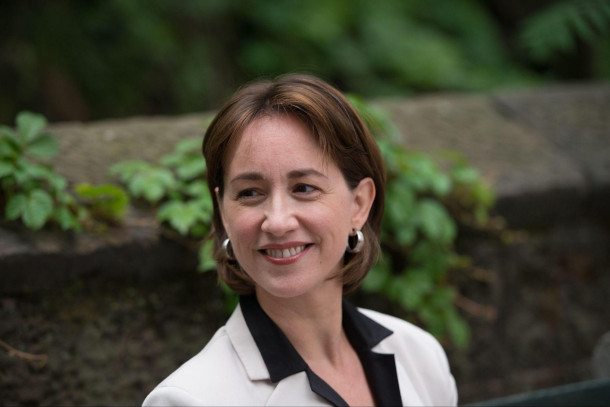
Dr. Erin Lothes is an educator, theologian, and public speaker committed to creating community action for climate justice. (Photo: Courtesy of Erin Lothes)
O'NEILL: Dr Erin Lothes is an environmental theologian and the author of Inspired Sustainability, Planting Seeds for Action, about what inspired successful interfaith care for creation. Erin, thank you so much for taking the time with us today.
LOTHES: Thank you, Aynsley, it's been a great pleasure to talk with you about care for creation and Pope Leo XIV. Thank you so much for having me.
Links
Living on Earth wants to hear from you!
Living on Earth
62 Calef Highway, Suite 212
Lee, NH 03861
Telephone: 617-287-4121
E-mail: comments@loe.org
Newsletter [Click here]
Donate to Living on Earth!
Living on Earth is an independent media program and relies entirely on contributions from listeners and institutions supporting public service. Please donate now to preserve an independent environmental voice.
NewsletterLiving on Earth offers a weekly delivery of the show's rundown to your mailbox. Sign up for our newsletter today!
 Sailors For The Sea: Be the change you want to sea.
Sailors For The Sea: Be the change you want to sea.
 The Grantham Foundation for the Protection of the Environment: Committed to protecting and improving the health of the global environment.
The Grantham Foundation for the Protection of the Environment: Committed to protecting and improving the health of the global environment.
 Contribute to Living on Earth and receive, as our gift to you, an archival print of one of Mark Seth Lender's extraordinary wildlife photographs. Follow the link to see Mark's current collection of photographs.
Contribute to Living on Earth and receive, as our gift to you, an archival print of one of Mark Seth Lender's extraordinary wildlife photographs. Follow the link to see Mark's current collection of photographs.
 Buy a signed copy of Mark Seth Lender's book Smeagull the Seagull & support Living on Earth
Buy a signed copy of Mark Seth Lender's book Smeagull the Seagull & support Living on Earth

